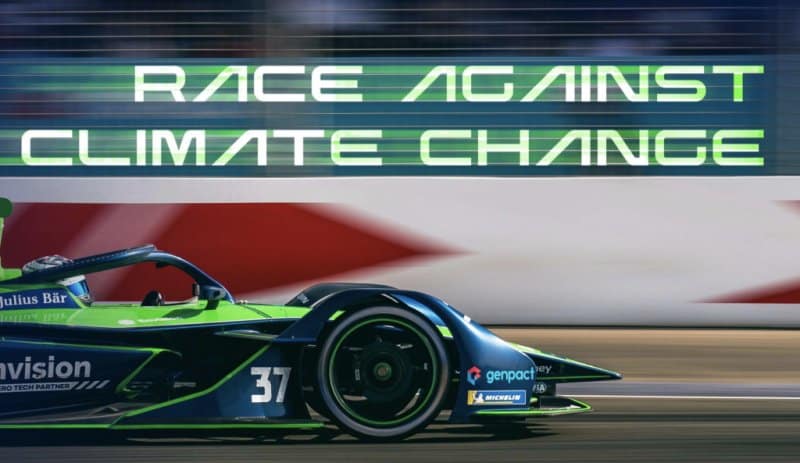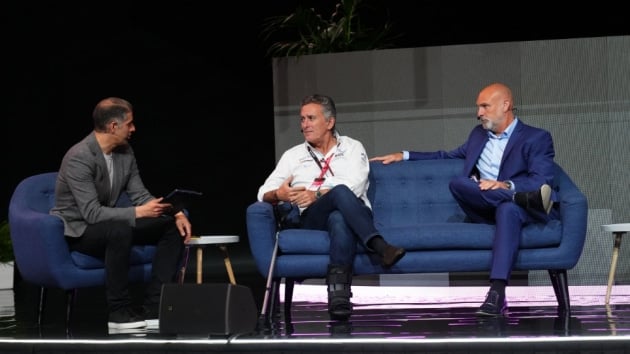This week encompasses what Toto Wolff calls sustainable high performance. Just because a racing series is using sustainable technology does not mean that it is anything but high performance.
Some of the topics covered are the use of sustainable aviation fuel by Mercedes F1, how Envision Racing are fighting climate change and the 7 ways Formula E leads the way for sustainable racing.
I also look at synthetic fuels in the World Rallying Championship, using an electric go-kart as a marketing tool and the possibilities of a “Frankenstein” motor in F1.
All this and much more in this week’s Sustainable Motorsport Roundup on Motorsport Prospects. Your source for sustainable high performance motorsport news.
Sustainable Motorsport News

The Mercedes Formula One team have reduced air travel emissions by 21 per cent thanks to investment in sustainable aviation fuel (SAF), according to their third annual sustainability report. Last year, Mercedes became the first global sports team in SAF, a renewable or waste-derived aviation fuel. It is an emerging technology recognised by the International Civil Aviation Organisation (ICAO) to play a major role in reducing future international aviation emissions. Before investing in the fuel, aviation accounted for more than one quarter of the Mercedes team’s entire projected carbon footprint.
Toto Wolff, team principal and chief executive of the Mercedes Formula One team, said: “Performance at any cost, without thought of the wider repercussions, is no longer acceptable in today’s world. But being sustainable doesn’t have to mean compromise. Delivering sustainable high performance has become a guiding principle in the way we operate. Over the last year, we have grown our sustainability activities to get a better understanding of our impact on the planet and our role within society, and to further explore ways in which we can improve. Hitting the brakes isn’t an option.”
You can download all of Mercedes F1’s sustainability reports here.

Global Sustainable Sport looks at how Formula E world champions Envision Racing are fighting climate change. “When it comes to its own operations, the team has committed to continuously reduce its carbon footprint and GHG emissions; to adopt a reduce, recover, recycle, and reuse approach to resources; to reduce energy consumption; to implement a sustainable travel policy; and to encourage employees to adopt green practices.”
Is it Fast? looks at the effect that extreme heat had at the recent Rome E-Prix and how climate change can affect motorsport events. “My experience at the Rome E-Prix reinforced the importance of considering weather conditions during race calendar scheduling. Motorsport events should take into account potential weather challenges to ensure the optimal fan experience. Canopies above grandstands could have provided much-needed shade and protection from the relentless sun, creating a more comfortable viewing environment.”
Lewis Hamilton’s Extreme E Team, X44 Vida Carbon Racing, has commissioned ‘Voices for Change’, a video series produced by Aurora and Earthrise Studio to highlight local community climate action.
The series consists of six films from Kenya, England, Brazil, Philippines, USA and India, featuring passionate activists who are actively involved in combating the effects of climate change on their communities.
Through the narratives of each film, the series seeks to create a ‘global conversation about the urgent need for sustainable transportation’ and a commitment to fighting climate change.
BlackBook Motorsport provided highlights from the recent Change. Accelerated. Live. event that took place during the London E-Prix weekend. “This year’s packed agenda was headlined by speakers such as Formula E founder Alejandro Agag and former Williams F1 deputy team principal Claire Williams, who were on hand to discuss the strategies driving change in transport, business, and society.”

Toyota intends to construct an all-new development centre for its World Rally Championship program as part of a new sustainability collaboration with Finnish city Jyvaskyla. At the center of this is a plan for Toyota to construct an environmentally friendly centre at a new site away from the team’s factory. The exact details regarding the time-frame for the completion of this project are yet to be defined.
Maris Priekulis of Blue Shock Racing describes the possibilities and opportunities of using an electric go-kart as a marketing tool. “As environmental consciousness becomes increasingly important to consumers, brands are seeking eco-friendly solutions that align with their values. Electric karts, powered by clean energy and sustainable technologies, exemplify a brand’s commitment to environmental responsibility. By branding electric karts with company logos, colors, and messages, businesses showcase their dedication to green practices, making a strong positive impression on customers and prospects.”
Toyota Motor Philippines (TMP) is commemorating its 35th anniversary by thanking its customers who have made TMP the market leader in the country. In line with the theme “Creating Happiness in Mobility,” TMP prepared special activities and promotions centered towards enabling customers to experience the thrill and joy of moving together.
“We dedicate this celebration to the generations of Filipino Toyota customers who have embraced the Toyota brand and become Toyota’s brand ambassadors,” TMP President Atsuhiro Okamoto said. “To thank our customers for this milestone and to give them a glimpse of our exciting future together, we are treating them to exciting and unforgettable activities this month to kickstart our 35th year.”
For its 35th year celebration, TMP is leveling up the joy of driving with customer experiences centered around its electrification push for carbon neutrality, and its drive to continue creating ever-better cars and memorable fan experiences through motorsports.
Formula 1 partner Aramco has seen their Q2 profits drop 38% to $30.1 billion. Aramco is working with Formula 1 on sustainable fuels research in preparation for their introduction in 2026.
Sustainable Motorsport Tech

Clean Fuels for All took part in the recent Secto Rally Sustainable Forum 2023 in Jyväskylä, Finalnd. This forum was held to discuss what motorsport (rally) can do to become more sustainable and more broadly how transport can reduce its emissions. Here are their notes from the event.
Keynote speech was delivered by Shigeru Hayakawa, Vice Chairman of the Board of Directors at Toyota Motor Corporation. He explained the commitment of Toyota to achieve climate neutrality by 2050 but reminded everyone of the importance of keeping on the market various engine technologies in order to not leave anyone behind.
Clean Fuels for All
Following this intervention, Henna Virkkunen, Finnish Member of the European Parliament took the floor. She highlighted sustainability is not only about the environment. Policy-makers should also look at the economics and societal impact when taking decision. That is why she is in favour of a technology-neutral approach when looking on how to reduce emissions from transport. A door should be left open for the inclusion in the legislation of CO2 in cars of e-fuels and biofuels.
A panel discussion took place between Marc de Jong, WRC promoter, Martin Poplica from P1 FUELS, Alain Mathuren from FuelsEurope and Matias Henkola from Secto Automotive. Some of the key takeaways from this discussion was that motorsport is a place where new technologies are being developed and it can be part of the solution for reducing emissions.
Renewable fuels are being used in the cars competing in the WRC Rallies. If these fuels work on these cars, they can work on any cars and they are CO2 neutral. The scaling-up of these renewable fuels is an important next step but a more favourable taxation would help. Today, these CO2 neutral fuels are taxed the same as the conventional ones.
Another important aspect to consider would be the way CO2 emissions are calculated. At the moment, in the EU legislation, they are calculated at the tailpipe. However, this does not take into account the emissions from the production of the energy and the emissions from the production of the vehicles its components and its recycling. Adopting a life-cycle assessment would help us compare fairly the environmental performance of different powertrains depending on their use cases.
For more on Clean Fuels For All’s work in the WRC, click here.
Series News

Men’s Journal looks at why Formula E is the fastest growing motorsports series and details 7 Ways Formula E Leads the Way for Sustainable Racing. Read the article for details on each.
- Net Zero Aspirations
- Arrival of Gen3
- Sustainable Batteries and Regenerative Braking
- Recycled Carbon
- New Sustainable Standards for Tire Rubber
- Sustainable Fluids
- Planet-Friendlier, PVC-Free Livery
Forbes asks the question, could a Formula E Car win a Formula 1 Grand Prix now? Looking at the results of the Genbeta test run (see last week’s Sustainable Motorsport Roundup) I suppose it is a legitimate question but then author James Morris explains why it could and should not. “I asked new Formula E boss Jeff Dodds about the possibility of his series racing against Formula 1 cars soon. He agrees that the racing could be quite competitive. But he also argues that it would be comparing apples to oranges, because the goals of the two motorsports are so different. Dodds says that Formula E’s sustainability message puts efficiency in a much more central place than brute performance. Formula E also has the exclusive license on single-seater battery or electric track racing until 2039, so we won’t see Formula 1 going electric anytime soon.”
The Formula E World Championship are set to auction a unique sculpture in support of UNICEF, with it being made up of broken Gen2 parts from all 11 teams. The ‘Children’s Planet’ sculpture has been designed and built by British sculptor, Charles Elliot, who created the masterpiece – which measures 2.5m in diameter – using broken parts from season eight Gen2 machinery. All 11 teams donated broken parts for the creation of the sculpture.
FIA President Mohammed Ben Sulayem has insisted it will push forward with its 2026 power unit regulation plans in the face of fears a ‘technical Frankenstein’ could be created as feared by Christian Horner.
“I respect what Christian says, but for me, what’s more important is what is good for the majority of teams and what is good for the sport as a whole. He didn’t seem to care much about the percentage distribution [between electric and combustion]. Whether that’s 60:40, 45:55 or 52:48. At the end of the day, it’s about why we’re doing this – which is because we want to reduce emissions by 80 per cent. Maybe we’re a little too optimistic there. But we’re aiming for 80 per cent, which should come from lighter cars, from the internal combustion engine, from the battery, from aerodynamics, and from less gasoline.”
When asked about going electric in the future, IMSA President John Doonan answered Grassroots Motorsports with the same answer he has been consistently giving.
“As we say in the office, the market will speak, but a lot of it depends on how the industry trends. The automakers that have joined us believe we’re in a sweet spot right now by retaining an internal-combustion engine along with a hybrid package and renewable fuels–certainly more on the renewable fuels side, and potentially other propulsion ideas. We’ve got to remember that we’re still in the business of entertaining people. And we have the best of both worlds right now with great sound and a sustainability story that’s authentic and real. We can never forget that we’re in the business of putting on a good show.”
From its launch three years ago, Extreme E has promoted inclusivity, environmentalism and modern technology as core strengths. Now those elements are starting to inspire other ventures like E-Xplorer FIM World Cup, an international electric all-terrain motorcycle racing series.
Valentin Guyonnet: “We did a call for expression of interest with the FIM (Federation Internationale de Motocyclisme, motorcycle racing’s equivalent to the FIA) and to see who would answer it. We had more or less 10 manufacturers who came out and said they wanted to participate,” Guyonnet says. “It showed directly that the manufacturers wanted to be involved. So what do we do? Do we take the same chassis for everyone? But we went to see, for example, Honda and I was like, ‘Would you be willing to race a KTM chassis?’ ‘Hell no!’ So OK, so we had no choice — we needed to make it open.




